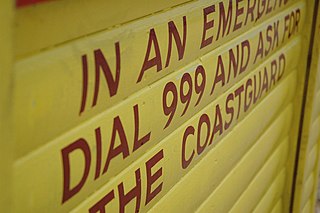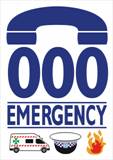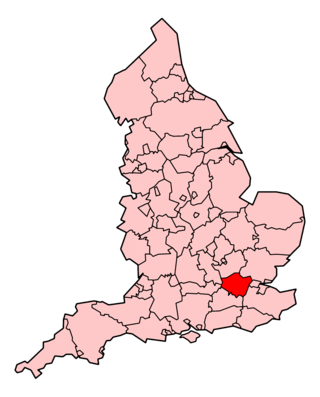Related Research Articles
Samaritans is a registered charity aimed at providing emotional support to anyone in emotional distress, struggling to cope or at risk of suicide throughout the United Kingdom and the Republic of Ireland, often through its telephone helpline. Its name derives from the biblical Parable of the Good Samaritan, although the organisation itself is not religious.

999 is an official emergency telephone number in a number of countries which allows the caller to contact emergency services for emergency assistance. Countries and territories using the number include Bahrain, Bangladesh, Botswana, Eswatini, Ghana, Guernsey, Hong Kong, the Republic of Ireland, the Isle of Man, Jersey, Kenya, Macau, Malaysia, Mauritius, Poland, Qatar, Sudan, Saudi Arabia, Singapore, Trinidad and Tobago, Seychelles, Uganda, the United Arab Emirates, the United Kingdom, and Zimbabwe.
111 is the emergency telephone number in New Zealand. It was first implemented in Masterton and Carterton on 29 September 1958, and was progressively rolled out nationwide with the last exchanges converting in 1988.

In the United Kingdom, telephone numbers are administered by the Office of Communications (Ofcom). For this purpose, Ofcom established a telephone numbering plan, known as the National Telephone Numbering Plan, which is the system for assigning telephone numbers to subscriber stations.
NHS Direct was the health advice and information service provided by the National Health Service (NHS), established in March 1998. The nurse-led telephone information service provided residents and visitors in England with healthcare advice 24 hours a day, every day of the year through telephone contact on the national non-geographic 0845 46 47 number. The programme also provided a web based symptom checkers on the NHS Direct website and via mobile, both as apps for iPhone and Android smart phones and a mobile website.

000 Emergency, also known as Triple Zero or Triple 0, and sometimes stylised Triple Zero (000), is the primary national emergency telephone number in Australia and Australian External Territories. The Emergency Call Service is operated by Telstra, and overseen by the Australian Communications and Media Authority (ACMA), and is intended only for use in life-threatening or time-critical emergencies.
119 (one-one-nine) is an emergency telephone number in parts of Asia and in Jamaica. From May 2020, 119 was introduced in the United Kingdom as the single non-emergency number for the COVID-19 testing helpline in England, Wales, and Northern Ireland. From January 2022, 119 was introduced in Romania as the single non-emergency number for reporting cases of abuse, neglect, exploitation and any other form of violence against the child.

The London Ambulance Service NHS Trust (LAS) is an NHS trust responsible for operating ambulances and answering and responding to urgent and emergency medical situations within the London region of England. The service responds to 999 phone calls across the region, and 111 phone calls from certain parts, providing triage and advice to enable an appropriate level of response.

One-zero-eight is a free-to-call telephone number for emergency services in India. It is implemented by the respective state and union territory governments, mostly under Public–private partnership with funding from the National Health Mission of Ministry of Health and Family Welfare, Government of India.

The Welsh Ambulance Services University NHS Trust is the national ambulance service for Wales. It was established on 1 April 1998 and as of December 2018 has 3,400 staff providing ambulance and related services to the 3 million residents of Wales. As of 1 April 2024, the trust was awarded "university" status by the Welsh government, making it the second ambulance trust to achieve university status in the United Kingdom.

NHS Wales is the publicly-funded healthcare system in Wales, and one of the four systems which make up the National Health Service in the United Kingdom.
NHS 24 is Scotland's national telehealth and telecare organisation. This special health board runs a telephone advice and triage service that covers the out-of-hours period. The telephone service allows people who feel unwell or those caring for them to obtain health advice and information if it is not convenient or possible to wait until they can visit their general practitioner when the practice is next open. The advice line is not intended as a substitute for obtaining an emergency ambulance service via 999. The telehealth services provided by NHS Scotland fulfil some similar functions to NHS Direct Wales and the NHS 111 scheme in England.

The North West Ambulance Service NHS Trust (NWAS) is the ambulance service for North West England. It is one of ten ambulance trusts providing England with Emergency medical services, and is part of the National Health Service, receiving direct government funding for its role.

Emergency medical services in the United Kingdom provide emergency care to people with acute illness or injury and are predominantly provided free at the point of use by the four National Health Services (NHS) of England, Scotland, Wales, and Northern Ireland. Emergency care including ambulance and emergency department treatment is only free to UK residents and a charge may be made to those not entitled to free NHS care.
National Health Service ambulance services provide free at the point of use emergency medical care to any person requiring treatment, regardless of immigration or visitor status, within the United Kingdom. These services are provided by National Health Services of England, Scotland, Wales and Northern Ireland. The current system comprises 14 NHS organisations: 11 ambulance services trusts cover the separate regions of England and; individual nationwide services cover Scotland, Wales and Northern Ireland respectively.
A non-geographic number is a type of telephone number that is not linked to any specific locality. Such numbers are an alternative to the traditional 'landline' numbers that are assigned geographically using a system of location-specific area codes. Non-geographic numbers are used for various reasons, from providing flexible routing of incoming phone calls to generating revenue for paid-for services.

Healthcare in the United Kingdom is a devolved matter, with England, Northern Ireland, Scotland and Wales each having their own systems of publicly funded healthcare, funded by and accountable to separate governments and parliaments, together with smaller private sector and voluntary provision. As a result of each country having different policies and priorities, a variety of differences have developed between these systems since devolution.
111 is a free-to-call single non-emergency number medical helpline operating in England, Scotland and Wales. The 111 phone service has replaced the various non-geographic 0845 rate numbers and is part of each country's National Health Service: in England the service is known as NHS 111; in Scotland, NHS 24; and in Wales, NHS111 Wales.
101 is the police single non-emergency number (SNEN) in the United Kingdom (UK), which automatically connects the caller to their local police force, in a similar manner to the pre-existing 999 emergency number. The 101 service was created to ease pressure, and abuse of the existing 999 system. Hazel Blears, then a UK government minister in the Home Office, stated that the new system would "strengthen community engagement". In 2004, ten million 999 calls were made in the UK; however, 70% of those calls were deemed not to be an emergency.

NHS Pathways is a triage software utilised by the National Health Service of England to triage public telephone calls for medical care and emergency medical services – such as 999 or 111 calls – in some NHS trusts and five of the ambulance services in the country. In its emergency capacity, it has replaced the Advanced Medical Priority Dispatch System for some trusts, and in non-emergency telephone triage it is found in many medical care triage systems, such as NHS 111.
References
- ↑ "Beating Cervical Cancer". Welsh Assembly Government. 17 July 2014. Retrieved 26 July 2014.
- ↑ Welsh Assembly Government - News - 2002 - Call Centre provides vital service, says Jane Hutt
- ↑ "Delivering Emergency Care Services, An Integrated Approach for Delivering Unscheduled Care in Wales" (PDF). Welsh Assembly Government. February 2008. Retrieved 26 July 2014.
- ↑ "111 service now available across Wales". GOV.WALES. Retrieved 12 April 2022.
- ↑ "Yellow Card Scheme - MHRA". yellowcard.mhra.gov.uk. Retrieved 4 November 2021.
- ↑ RNID Typetalk
- ↑ "About us: What happens when I call NHS Direct Wales?". NHS Direct Wales. Retrieved 26 July 2014.
- ↑ "Encyclopaedia". NHS Direct Wales. Retrieved 26 July 2014.
- ↑ "Local Services". NHS Direct Wales. Retrieved 26 July 2014.
- ↑ "Ask us your Health Question". NHS Direct Wales. Retrieved 26 July 2014.